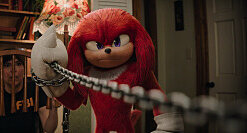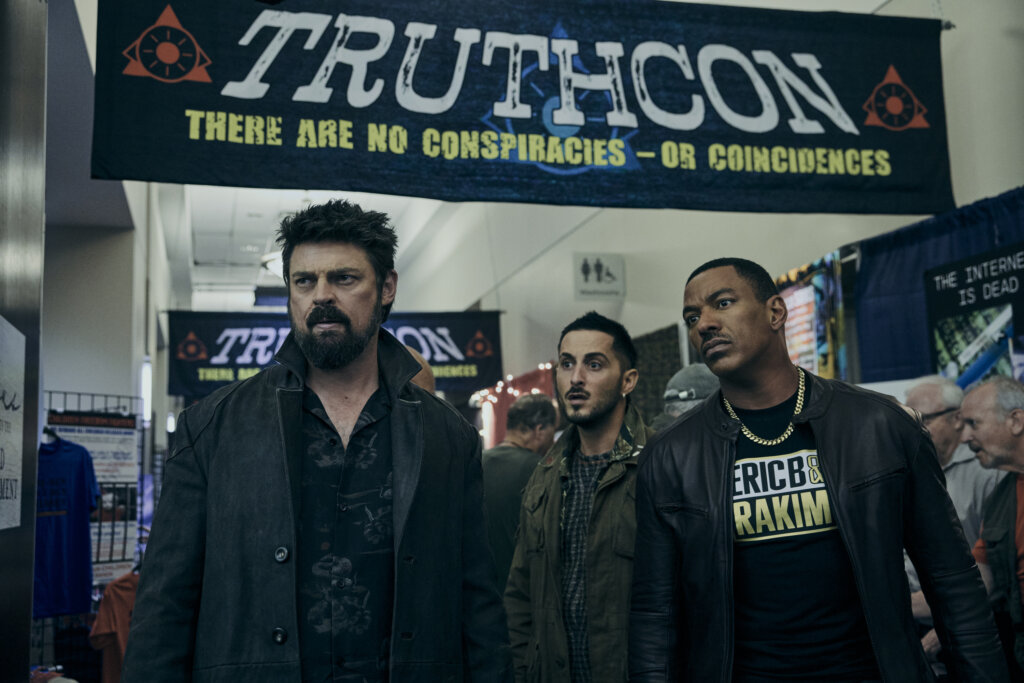Why ‘Hava Nagila’ is TV’s new fight song
‘Knuckles’ and ‘The Boys’ recently used the song in some elaborate fight scenes

“Hava Nagila” is great to dance to — but also maybe to fight to? Graphic by iStock/Canva
“Hava Nagila” is the typical soundtrack to Jewish weddings and b’nai mitzvah — and, these days, brutal hand-to-hand fighting with naked combatants.
Two streaming shows have recently picked up where Guy Ritchie, who used the folk song in his 2000 crime flick Snatch, left off.
Paramount+’s Knuckles, a spinoff of the Sonic the Hedgehog films, was the first to do it this year in an episode called “The Shabbat Dinner.”
For the unfamiliar, Knuckles follows the titular red echidna (voiced by Idris Elba), who befriends a police officer named Wade Whipple (Adam Pally). One Friday evening, hiding out at Whipple’s mom’s house, Knuckles samples some Jewish cuisine (“it has the consistency of a wet sponge. I cannot stop eating it,” Knuckles says of gefilte fish) and learns the significance of Shabbat.
Coming from a tribe destroyed by giant owls, Whipple’s mother, Wendy (Stockard Channing), asserts that Knuckles is “basically Jewish.”
Unfortunately the day of rest is interrupted by a gang of thugs, and, ordered to “protect the candles at all costs,” Knuckles and Wendy use krav maga and cookware to ward off the assailants, while a chipper rendition of “Hava Nagila” plays and the camera circles the candles. Such acrobatics for “Hava Nagila” have seldom been seen outside an Aly Raisman floor routine.
So joyful was this fight scene, and the surrounding Shabbat lessons, that The Daily Beast proclaimed that Knuckles was “the show Jews need right now.”
But equally essential — if far less appropriate for families — is The Boys, which just began its fourth season and continues to offer some of the smartest satire of alt-right conspiracy theorists and their obsession with Jewish control.

In the second episode of the new season, the Boys, a ragtag team looking to thwart the monstrous behavior of corporate superheroes, attend a convention called “Truthcon” containing all manner of paraphernalia suggesting elites like Tom Hanks and Oprah are pedophiles. One sign simply reads “The Jewish Peril.”
Later in the episode the crew falls into a trap and ends up bursting from a back room at the venue into a Mrs. Maisel-themed bat mitzvah (The Boys, like Maisel, airs on Amazon).
The Barry Sisters’ version of “Hava Nagila” comes over the speakers as guests dance the Hora and the bat mitzvah girl (the “Marvelous Miss Rachel”) is held aloft on a chair.
It looks like a great time until — stay with me — a crew of naked, self-replicating men with assault rifles come through the door. (It’s really one dude named “Splinter” — he’s naked because his clothes rip when he makes a copy of himself.)

The guests flee as gunfire is exchanged. Then a “rock version” of “Hava Nagila” kicks in and the character of Mother’s Milk (Laz Alonso) and Frenchie (Israeli actor Tomer Capon) push the bad guys into a chocolate fountain.
An alt-right superhero influencer named Firecracker goes live on Instagram, claiming she has infiltrated “a Zionist cabal,” and aiming the phone at a cardboard cutout of Abe Maisel as “proof.”
Mother’s Milk ends the life of one of the naked Splinters by bashing in his skull with a nearby menorah. In case you felt bad for the guy, his final words to Firecracker are “We loved your from your first Holocaust hoax video.”
While “Hava Nagila” is often used as a lazy shorthand for Jewishness, in both the case of Knuckles and The Boys, the song is paying loving homage to ritual, from the sacredness of Shabbat and a young woman’s rite of passage to the always wonderful tradition of roughing up Nazis.
True to the lyrics — “Let Us Rejoice” — there is much to celebrate in TV’s new fight song.















